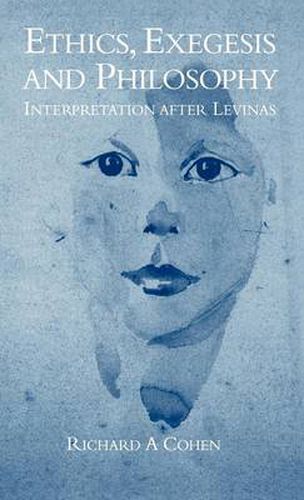Readings Newsletter
Become a Readings Member to make your shopping experience even easier.
Sign in or sign up for free!
You’re not far away from qualifying for FREE standard shipping within Australia
You’ve qualified for FREE standard shipping within Australia
The cart is loading…






The reputation and influence of Emmanuel Levinas (1906-96) have grown powerfully in recent years. Well known in France in his lifetime, he has since his death become widely regarded as a major European moral philosopher profoundly shaped by his Jewish background. A pupil of Husserl and Heidegger, Levinas pioneered new forms of exegesis with his postmodern readings of the Talmud, and as an ethicist brought together religious and non-religious, Jewish and non-Jewish traditions of contemporary thought. Richard A. Cohen has written a book which uses Levinas’ work as its base but goes on to explore broader questions of interpretation in the context of text-based ethical thinking. Levinas’ reorientation of philosophy is considered in critical contrast to alternative contemporary approaches such as those found in modern science, psychology, Nietzsche, Freud, Husserl, Heidegger, Sartre, Merleau-Ponty, Derrida and Ricoeur. Cohen explores a manner of philosophizing which he terms ‘ethical exegesis’.
$9.00 standard shipping within Australia
FREE standard shipping within Australia for orders over $100.00
Express & International shipping calculated at checkout
The reputation and influence of Emmanuel Levinas (1906-96) have grown powerfully in recent years. Well known in France in his lifetime, he has since his death become widely regarded as a major European moral philosopher profoundly shaped by his Jewish background. A pupil of Husserl and Heidegger, Levinas pioneered new forms of exegesis with his postmodern readings of the Talmud, and as an ethicist brought together religious and non-religious, Jewish and non-Jewish traditions of contemporary thought. Richard A. Cohen has written a book which uses Levinas’ work as its base but goes on to explore broader questions of interpretation in the context of text-based ethical thinking. Levinas’ reorientation of philosophy is considered in critical contrast to alternative contemporary approaches such as those found in modern science, psychology, Nietzsche, Freud, Husserl, Heidegger, Sartre, Merleau-Ponty, Derrida and Ricoeur. Cohen explores a manner of philosophizing which he terms ‘ethical exegesis’.